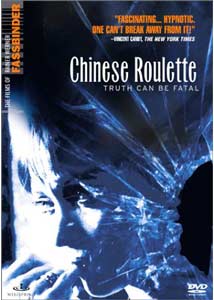 Critics have been surprised by Leigh making a comedy as if that wasn't his normal routine. One might point to the fact that Leigh usually blends comedy and tragedy in equal measure, but Happy Go Lucky has just as much darkness and social insight as many of his previous films, despite the superficial optimism and lightness of touch. Leigh films contemporary London through the eyes of Poppy (Sally Hawkins), a primary school teacher who observes the world around her with wide eyed wonder. Dedicated to helping others, Poppy tries to make everyone else as happy as she is but discovers that you can't make everyone happy.
Critics have been surprised by Leigh making a comedy as if that wasn't his normal routine. One might point to the fact that Leigh usually blends comedy and tragedy in equal measure, but Happy Go Lucky has just as much darkness and social insight as many of his previous films, despite the superficial optimism and lightness of touch. Leigh films contemporary London through the eyes of Poppy (Sally Hawkins), a primary school teacher who observes the world around her with wide eyed wonder. Dedicated to helping others, Poppy tries to make everyone else as happy as she is but discovers that you can't make everyone happy.Leigh first shows Poppy cycling around London, completely carefree but her world is turned upside down when her bicycle goes missing (a reference to de Sica's 'The Bicycle Thief'' perhaps?), which encourages her to take driving lessons from Scott (Eddie Marsan). Leigh then explores the differences between the two teachers. Poppy encourages creativity, spontaneity and personal fulfilment whilst Scott encourages order, taking instructions and doing as one is told. The complete opposite of Poppy, Scott is obviously troubled and angry (as well as displaying racist tendencies). Poppy tries to reach out to him but can't; her sunny disposition might work for her flatmate, sister and colleagues but this only makes Scott more frustrated and angrier, culminating in a vicious final driving lesson.
Leigh throws in social commentary about parenting issues, bullying and upward mobility, which rings true to varying extents. Poppy and her colleagues discuss problems that children face; lack of green space, past times that go no further than playing video games or the Internet as well as parents juggling many responsibilities. These are all very relevant, however I found the next two sets of social commentary a bit too contrived. The bullying angle serves solely as a means for Poppy to meet a handsome social worker with whom she begins a budding relationship by the end of the film. After the first meeting with him at the school, the whole issue disappears - we never see the children again. Leigh concedes though that bullying itself is usually caused by some trauma of sorts and that's handled sensitively enough but it just feels a secondary issue. Satirising upward mobility is something Leigh seems to add to every film of his and by now it's starting to get a little tiresome. Poppy's pregnant sister lives in the Essex suburbs with her husband and seems to have no interests outside her garden and flat pack furniture, contrasting with Poppy's hectic and energetic life. It's not very subtle and just feels like it's been done before.
'Happy Go Lucky' has been roundly praised and has already won the Best Actress award at Berlin. I don't know whether there's an innate tendency for British critics to shower half decent domestic films with more praise than they deserve because I really don't see this as the masterpiece some would have you believe. I found it incredibly uneven; very funny in places but not very subtle in many respects. The success of the film rests with Poppy and whether you like her as a person. She's sparky and lively but when you hear Scott tear into her near the end of the film with everything he despairs about her, you can't help but agree with some of what he says, even though the whole diatribe is supposed to reflect upon him and his personality. She just gets a little tiresome, not with her optimism as such but the lack of roundness of her personality. It's a good film but never a great film. 3/5



